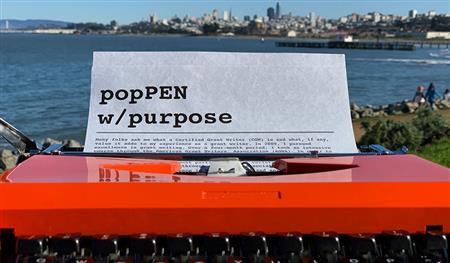
“To change ourselves effectively, we first had to change our perceptions.” — Stephen R. Covey, Leadership Author
Rotary is a place to belong, to serve, and to grow professionally. I’ve belonged to the Rotary Club of Cabarrus County NC and the Rotary Club of San Francisco CA. Professional men and women, of all ages, work as part of these clubs. They intensely give back to local and international communities.
For the past seven months, I have reflected on my year as the '18-'19 Rotary Club of San Francisco President. I experienced a year of greater belonging and greater purpose. But the thing that has surprised me most was how it required me to change my daily perception. And particularly as my perception connects Grant Consulting and Rotary Leadership.
per·cep·tion /pərˈsepSH(ə)n/ A way of regarding, understanding, or interpreting something; a mental impression
Communication at its best can get distorted by perception.
150 members make up the Rotary Club of San Francisco, originating from every corner of the US and other countries. And add to this over 40 international guests annually (or more). Each is fluent in other languages and cultural knowledge. Two to three hundred or more service recipients are part of our local Rotary community.
Because of this cultural explosion, I was humbled every day to learn that my own perception was/is significantly limited. This realization has affected my communications as a grant consultant. So I now work to get the viewpoints from as many team members as possible, even if time consuming. Also, I now consider that others may better receive my message from two-three varying formats, be they team members or funders.
My limited perception compared to other Rotary Leaders is humbling.
The Rotary Board serving beside me was a dozen individuals, each proficient in their respective lines of work and each utilizing their strengths collectively towards one passion. Each held a uniquely intriguing perception; be it orientation; interests; managerial styles; or years in the City, for instance. Truthfully, they were the more qualified, and yet leading them was like running a small company, learning as I went.
Leading this board changed my approach to guiding teams through a grant proposal process with greater confidence. The client team is the topical expert and they are inviting me into the process as a guest, temporarily leading the group. My background is somewhat limited to best grant practices and previous work. I look to their vast experiences as a new world of possibilities, ways of thinking and insights.
Rotary Leaders and Grant Funders alike HATE to say “no”.
Fellow Rotary members recall my first meeting. Because I gave instructions that felt counter-intuitive to serving. I told them to please say “no” to the tasks and opportunities that really weren’t their passion. Likewise, as a member of the San Francisco Rotary Foundation’s review process, I hated saying “no” to a few fellow club members whose projects (meeting critical needs mind you) didn’t make our annual funding cut.
Others tell Grant Consultant/writers “no” repeatedly. Hearing this cuts. And we try our best not to take it personally. Funders take no pleasure in turning down well-intentioned organizations. Because these orgs are positively impacting communities daily. And because it is part of a larger picture for the greater impact.
So our perceptions drive who we are and who we will become. Grant Consulting and Rotary Leadership benefit from a change in perception. We look beyond ourselves when we serve. We walk away from service as better professionals.
Rhonda Poppen is the 2018-2019 president of The Rotary Club of San Francisco and an independent grant consultant and certified grant writer, working from San Francisco alongside Buddy, Labrador/Great Dane and office mate. She is a self-proclaimed pen, paper and word nerd who pours her heart into writing winning grant proposals. All content and photos here are created solely for the popPEN w/purpose blog and have been reprinted here with the permission of Ms. Poppen.